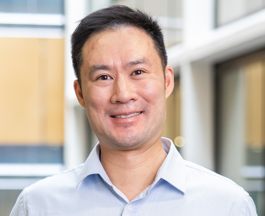
My Expertise
Expertise: I am a computational biologist and bioinformatician specializing in developing computational tools and analyzing genomics, transcriptomics and proteomics data. I work primarily with immunological and virological data to understand fundamental immunological mechanisms and discover biomarkers for therapeutics and diagnostics. My work involves collaboration with academic, health and industry across NSW, Australia and internationally.
Approaches: I develop computational tools to analyze biological data using my multi-disciplinary background in engineering and statistical machine learning. I also have extensive experience in analyzing single-cell multi-omic datasets.
Impact: My analysis of single-cell data has led to numerous insights into understanding the evolution of immune cells in the context of CAR T immunotherapy and cealiac disease.
Keywords
Fields of Research (FoR)
Immunology, Autoimmunity, Cancer therapy (excl. chemotherapy and radiation therapy), Infectious Diseases, Biological Mathematics, BioinformaticsSEO tags
Biography
I am a computational biologist and bioinformatician, with a current focus on applying machine learning and computational tools to analyze immune cells in patients with HCV, cealiac disease or blood malignancies treated with CAR T therapy.
I received a PhD in Electrical Engineering at the University of Sydney, after which I was an ARC Postdoctoral Fellow focusing on wireless communications. I then moved to the Hong Kong University of Science...view more
I am a computational biologist and bioinformatician, with a current focus on applying machine learning and computational tools to analyze immune cells in patients with HCV, cealiac disease or blood malignancies treated with CAR T therapy.
I received a PhD in Electrical Engineering at the University of Sydney, after which I was an ARC Postdoctoral Fellow focusing on wireless communications. I then moved to the Hong Kong University of Science and Technology, where I focused on applying statistical and machine learning tools to viral sequence data, to aid in the design of effective vaccines. My background allows for a unique multi-disciplinary approach to solving biological problems.
I am currently recruiting PhD students. Please contact me if interested.
My Grants
-
NHMRC Ideas Grant CIB (2024-2027)
-
"Harnessing Pathogenic Immune Cells to Develop a New Diagnostic for Non-Responders and Refractory Conditions in Celiac Disease", AUD $1,094,640.50.
-
-
Hong Kong Research Grants Council General Research Fund, Chief (Primary) Investigator (2017-2019)
-
“Statistical inference of the fitness parameters driving viral evolution using time series data”, HKD 482,605 (AUD 77,168.32)
-
-
Hong Kong Research Grants Council General Research Fund, Chief (Primary) Investigator (2016-2018),
-
“A novel statistical inference framework for big data applications: Identifying hidden multi-variate non-linear associations”, HKD 696,029 (AUD 111,294.72)
-
-
Australian Research Council Discovery Project grant, Chief (and sole) Investigator (2011-2013).
-
“Design of future cognitive radio relay networks”. AUD 255,000
-
My Qualifications
-
PhD. in Electrical Engineering, University of Sydney, Australia
-
B.E/B. Sc. in Electrical Engineering/Computer Science (1st Class Honours), University of New South Wales, Australia
My Research Activities
Rational vaccine design using computational models: The past few years has seen an abundance in sequence data for viruses such as SARS-CoV-2, HIV and HCV. This information can be exploited for the rational design of vaccines, by building models which capture the patterns in the viral sequences. These patterns can be exploited to find weaknesses in the virus, which can then be used to design effective vaccines.
Developing a machine learning model to predict disease outcome: Accurately predicting disease outcomes can have a significant impact on patient care, leading to early detection, personalized treatment plans, and improved clinical outcomes. Machine learning algorithms provide a powerful tool to achieve this goal by identifying novel biomarkers and drug targets for various diseases. By integrating machine learning algorithms with biological data, you will have the opportunity to push the boundaries of precision medicine and contribute to algorithms that can revolutionize the field. Such biological data includes single-cell datasets, where we have considerable experience.
My Research Supervision
Areas of supervision
Bioinformatics
Computational Biology
Machine learning
Cancer
Immunotherapy
My Teaching
- BINF3010 Applied Bioinformatics (UNSW)
- T2 2023 (lecturer in charge)
- BINF3020 Computational Bioinformatics (UNSW)
- T3 2023 (guest lecturer)
- ENG1811 Computing for Engineers (UNSW)
- T2 2023 (co-teaching)
- ELEC2100H Honors – Signals and Systems (HKUST)
- Fall 2015, 2016, 2017 (full course)
- ELEC5450 – Random Matrix Theory and Applications (HKUST)
- 8/3/2017, 15/3/2017, 16/3/2018 (guest lecturer)
- BIEN5040 – Introduction to Bioengineering Research (HKUST)
- 23/9/2015, 30/9/2015, 7/10/2016 (guest lecturer)
- ELEC2600 - Probability and Random Processes in Engineering (HKUST)
- Fall 2014 (full course)
- 8/11/2013 (guest lecturer)
- ELEC5507 – Error Control Coding (University of Sydney)
- 2010-2012 (full course)